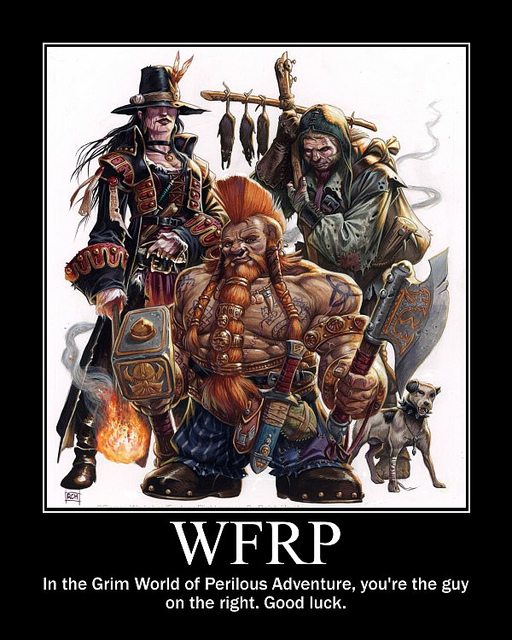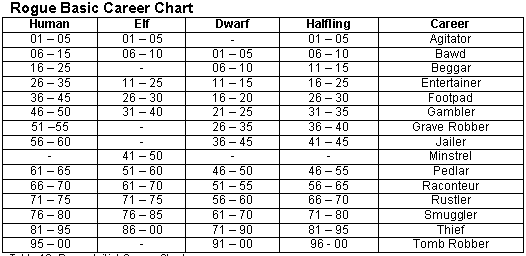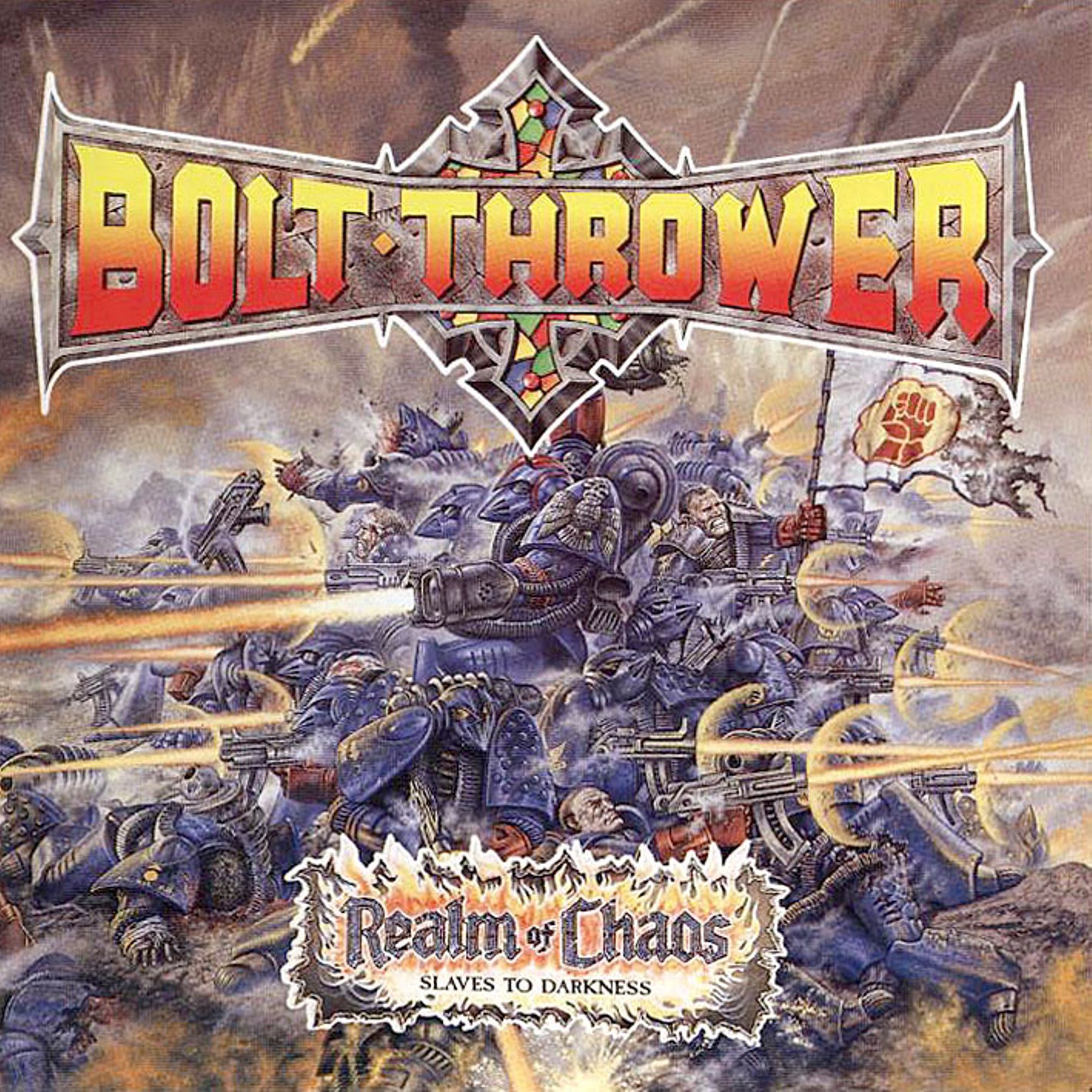A Grim World of Perilous Adventure
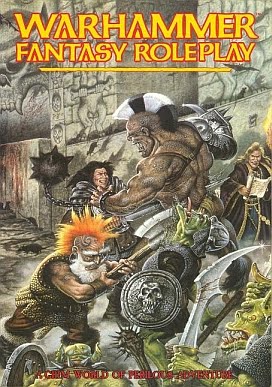
Warhammer Fantasy Roleplay came out in 1986 and represented the snake getting tired of its own tail and moving up the chain to desert. Games Workshop had gotten their start distributing TSR's materials in the UK, and had leveraged their distribution monopoly of D&D into a commanding position of game ownership in general – by 1980 they had already started their takeover of game stores that is so familiar to British gamers today. They had a miniatures line that made figurines for D&D and Runequest, and in 1983 they had decided to cut themselves loose and release a battle game for people to actually play with their minis without needing a third party game. In 1986 they decided to make the jump from Chainmail to D&D just as TSR had done a decade earlier: they made their very own RPG.
This was the heady days of Warhammer Fantasy Battles 2nd edition (3rd edition would be released in '87), when the setting of the game was still very much ripped straight from Tolkien, but had started to really gel as its own thing. As such it is mostly familiar to anybody that has played Warhammer Fantasy, but there are still lots of little weird what-the-fucks that cropped up before the setting had finalized things like "no dwarf wizards" and "no half-orcs." It also ripped off as much as it thought it could get away with from the existing major RPGs of the day, which boiled down to D&D and RuneQuest.
The United Kingdom wasn't wholly isolated from role playing games in the 80s. While the import duties were fierce, it was possible to get a copy of whatever the latest RPG was from America. Bigger names like Dungeons & Dragons and Call of Cthulhu had UK editions printed up in Britain somewhere in order to avoid import duties. But between the difficulties of seeing physical copies of new materials and the lack of an internet, the United Kingdom in the eighties was fairly isolated from gaming culture as a whole. This allowed them to spend a lot of time reinventing the wheel, and also allowed them to set off on some truly different development paths. This book is 364 pages long, hardcover, with art or tables on almost every page. That just wasn't done in 1986. That became an industry standard for shovelware materials when printing and layout costs came down with digitization in the 21st century, but these guys were doing it all with photographic plates. It's actually pretty insane.
The book may superficially look like a book like Scion, but it's actually not. Scion was cobbled together digitally over a few months by a dozen hacks working on a deadline. But WFRP was designed by just five people and my fucking goodness it must have taken them years. There are literally more people assigned to paste up than there are to design and development. “Paste up” is a that used to happen where pieces of text and art were cut up and then pasted together into a collage and then photographed to make copy plates for printing. The amount of labor that went into this thing is staggering, and it didn't get a second edition for almost twenty years. The copy I'm looking at was printed in 1995, fully nine years after the initial print run – and it's basically unchanged. It was already an anachronism when it was written, and they kept printing it long after everyone involved should have known better.
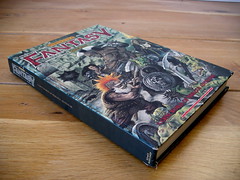
It is a thing of glory. It is also remarkable for how long it lasted, and with so few books. The first edition went through three publishers and lasted from 1986 until 2005, and for the most part was defined by its large multi-part campaigns more than any setting or expansion books - The Enemy Within being the major arc, and the second Doomstones campaign taking fifteen fucking years to see the last part published. For a while Games Workshop even tried to keep the setting in tune with their miniatures game with the two-part Realms of Chaos books. Hell, the main book had full page color insert plates just to pimp using the GW minis in your games!
And, something else that needs to be said - Games Workshop pursued a cohesive art approach years before that became industry standard. There was general agreement about what dwarf slayers and goblins were supposed to look like a long time before other games got their acts together, so even if something like 90% of the art in this hardbound phonebook looks like generic fantasy plonk these days, that 10% consistency means a lot.
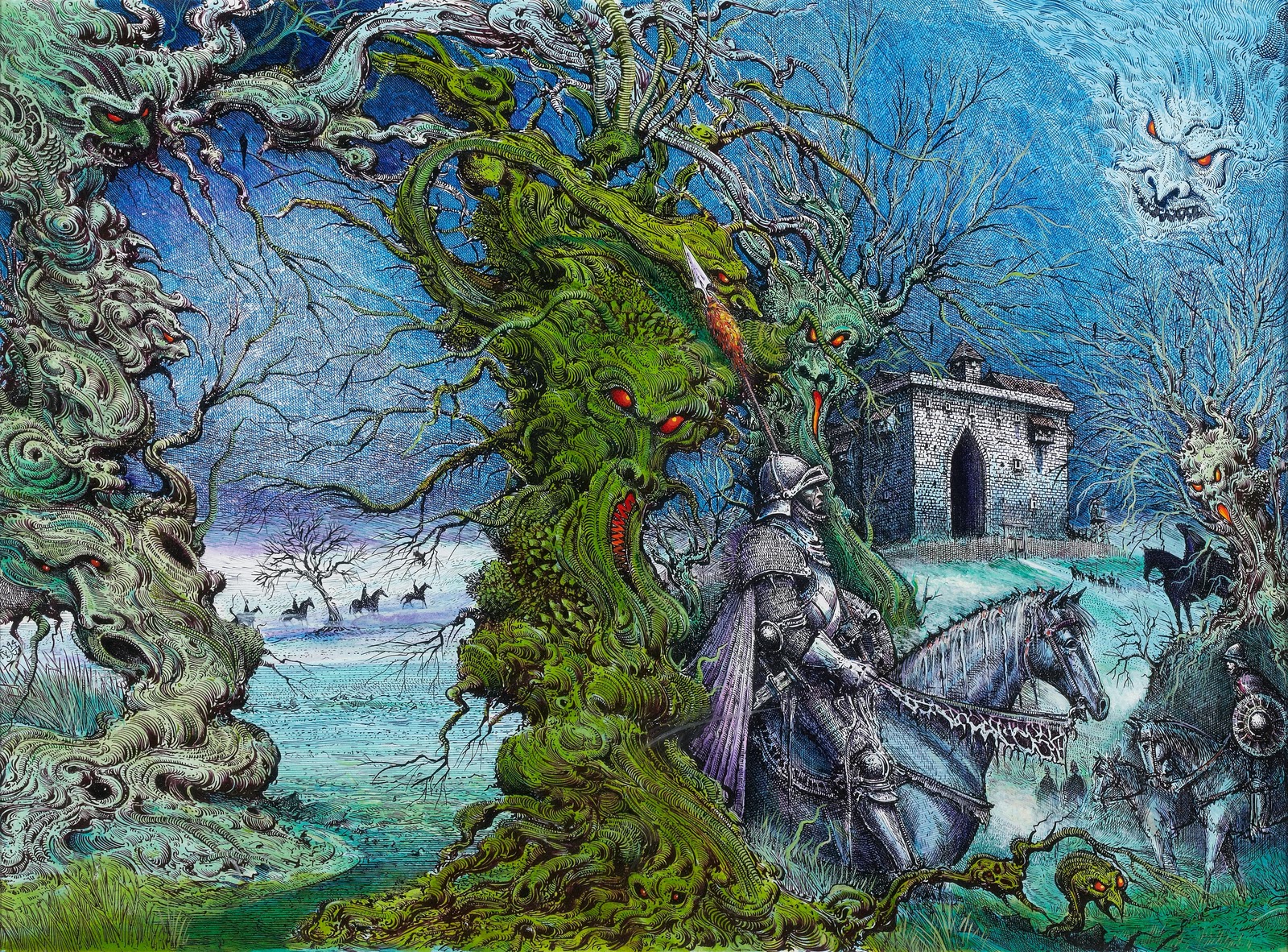
Also, they got Ian Miller to do some of the art. Not in this book of course, but other books. And that's just pure win.
More a child of the seventies than of the eighties, Warhammer was thoroughly indebted to the works of Tolkien and Moorcock. The races are Tolkien races, the teams are Moorcock teams. The art stylings look like the more fantasy-themed sketches from heavy metal magazines of the 70s. That's not an accident or anything, they actually used artists whose work included heavy metal magazines from the seventies. The only thing that's missing is giant boobs hanging out everywhere, which I think is a shame. This book would obviously be better with more boobs.

Warhammer also inspired bands that based their music and covers on their art. Because why not?
The lack of boobs also points this out as a period product, actually. D&D wasn't above using tits to sell games to horny teenagers, but even those were few and far between. Warhammer Fantasy Roleplay was gaming in the era when Charles Stross was cribbing George R. R. Martin in the pages of White Dwarf, down at the record shop some guys were listening to this new record by a band called Megadeth, every week Judge Dredd delivered justice, you could probably still catch a second-run of Legend down at the discount theatre, and parents were just beginning to get bothered about Dungeons & Dragons. It was a great time to be alive.

Little did he know, Tim Curry would never look this good again.

This is mandatory when talking about Judge Dredd.
Nowadays we make fun about the grim darkness and dark grimness that came out of the late 80s, but this is really where it started. It needs to be said: I loved this book when I first found it. Part of me still does, and always will.
Introduction
The introductory fiction follows the beginning of the adventures of Sven. He has a Nordic name, because Warhammer Fantasy Roleplay is set in the middle of The Empire, which is the center of Human power. It is also Germanic flavored and themed off the Holy Roman Empire whenever they can remember to have it be “not British.” The book is written by sheltered British guys, so remembering to have things be “not British” is something they don't do all that often. Now, they don't go the full Neo-Nazi (that's for 40k!), but casual British racism is totally a thing. Recall, that at this point in time, Warhammer had a “Pygmy” race, and they looked like this:
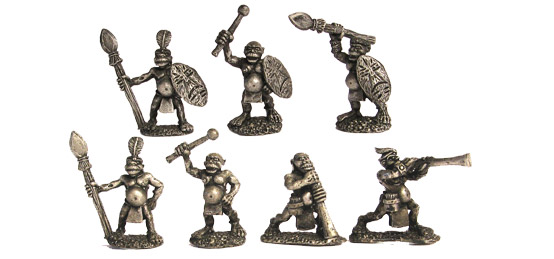
Remember that the guys writing all this didn't have the bazillion Tolkien knock-off trilogies that we have today; they barely had anything to steal from directly at all (okay, that's a lie, but I try not to bring up Lin Carter.)

Anyway, I can't say this for certain, but I'm about 85% sure they started off with the Map. Because the Warhammer Map, in its various incarnations, has not changed much in thirty years. It looks a lot like our world with the absence of Australia, which I don't think anybody was really sad about, and it owes quite a lot to Tolkien's maps in the Lord of the Rings and Robert E. Howard's map of Hyboria.
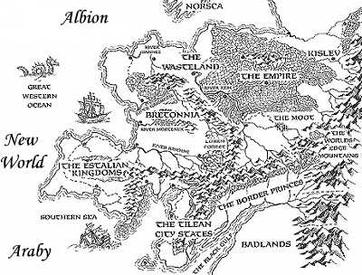
One of the things about Warhammer's “Old World” is that it couldn't decide how much of a fantasy world it actually was. When they remembered, they'd write in fantasy cultures and fantasy races and fantasy kingdoms, but everything outside Britania was considered “foreign enough” to be used unaltered. So Abrahim in the story is actually “an Arab.” He's not a Katapeshian who basically feels Arabic, he's literally and specifically described as being an Arab. Because apparently “Arabia” is a place on their fantasy map. They also had Norsemen who were described as such. Apparently they could put together a 364 page art-filled fanzine, but thinking of fantasy names for all the ethnicities they wanted to use was just a bridge too far.
Part of the reason was that this product was very close to its wargaming roots. Obscenely so, in some cases. We like to look at D&D 3rd edition as an excuse to sell miniatures, but in the case of WFRP they weren't even fucking trying to hide it. Tremendous attention was given to the combat rules, movement, the little internal maps look exactly like the wargaming hexes, it's amazing. And it is to be remembered that historical wargaming was still (and continues to be) a thing in the UK, and people were totally cool with playing characters in a faux-Europe that dealt with Norsemen and Arabians and Khitans and whatnot. It was complete in keeping with the Robert E. Howard approach to "fuck it, I like the sound of that, let's keep it."
Sven's party is made out of adventurers who were things like a fisherman and a university student. It comes off kind of weird in the story, but that's actually what the game expects you to play as. Being like a Wizard or a Warrior is just kind of beyond what this game things you can handle. Those sorts of “advanced classes” aren't even in the player's section of the book.
But remember: you don't actually get any magic, and scarcely get any sword-play. You fucking power gamer.Sven's adventures are just beginning – and now you can begin your career as an adventurer in the
Old World, the setting for the Warhammer Fantasy Roleplaying Game. In this book you will find all the rules and information you need to play this exciting game of heroic magic and sword-play, in an easy-to-follow format. Read on, for this is where the adventure starts.
This was old-school roleplay, and let the dice fall where they may!
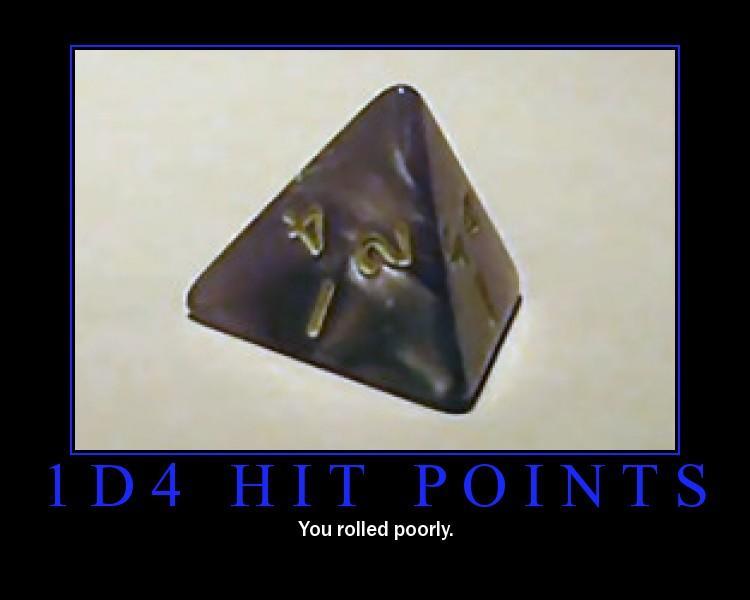
Shit. Hand me another character sheet, will you?
